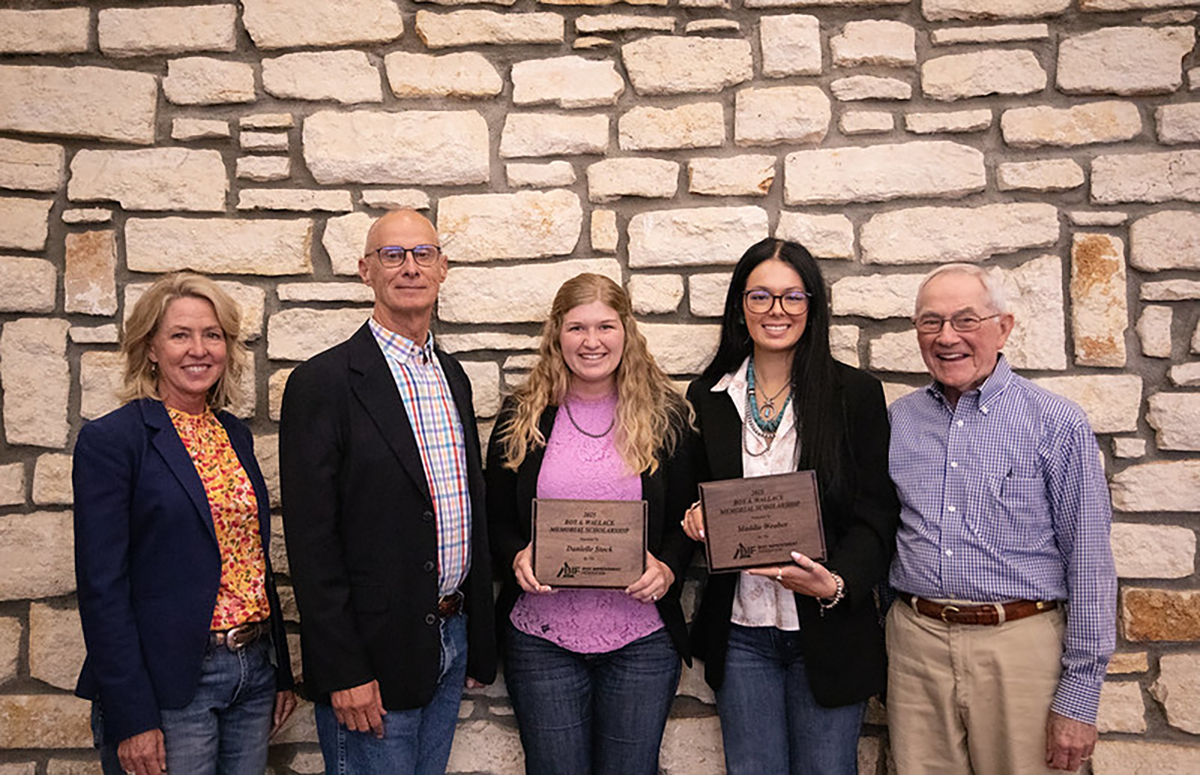 The scholarships were established to encourage young men and women interested in beef improvement to pursue those interests, as Wallace did, with dedication and passion.
The scholarships were established to encourage young men and women interested in beef improvement to pursue those interests, as Wallace did, with dedication and passion.
Each year, two $1,250 scholarships are awarded—one to an undergraduate student and one to a graduate student.
Stock, the graduate student recipient, is from Waukon, Iowa, and is pursuing her doctorate at Kansas State University. Weaber, the undergraduate
recipient, is from Wamego, Kansas, and recently completed her freshman year at Oklahoma State University.
Stock was raised breeding registered Gelbvieh and Balancer cattle in northeast Iowa. She credits 4-H and the American Gelbvieh Junior Association
with shaping her strong passion for the beef industry. She earned her bachelor’s degree from Iowa State University. Her beef interests include genetic testing, mating decisions, artificial insemination and embryo transfer.
Stock’s master’s
research at Kansas State focused on the genetic influence on scrotal circumference and semen quality traits in Angus bulls. Now, as a doctoral student, her research centers on refining methodologies for collecting, preserving and analyzing bull semen
to improve fertility and reproductive success in artificial insemination and natural mating.
“My future career aspiration is to merge my passions for research and teaching into a career in academia that nurtures the next generation of innovative
beef producers,” Stock said. “I want to build a research program that tackles practical questions with a real impact on cow-calf producers. Ultimately, I want my work to bridge the gap between research and industry application, making
fertility selection more reliable and effective for beef producers.”
Weaber is an animal science major with an interest in beef production and genetics. She is passionate about food security and the role beef production plays in providing nutritious
food to consumers.
At Oklahoma State, she is involved in the Oklahoma Collegiate Cattlewomen’s Association, Block and Bridle, and Sigma Alpha. Her future collegiate plans include competing on the meats judging team and continuing her education
in graduate school. She is also a fifth-generation Hereford producer and remains active in the National Junior Hereford Association.
“My long-term career goals are to spend my time working hands-on with cattlemen throughout the country and world,”
Weaber said. “I want to give them the technological tools necessary to elevate their operations to the best they can be, while making food as accessible as possible.”
The Roy A. Wallace Beef Improvement Federation Memorial Fund was established
by Select Sires to honor its namesake.
Wallace, who worked for Select Sires for 40 years, served as vice president of beef programs and devoted his career to improving beef cattle. He became involved with the Beef Improvement Federation in its infancy
and was the only person to attend its first 40 conventions.
Wallace was passionate about the organization’s mission—bringing together purebred and commercial cattle breeders, academia and breed associations, all committed to improving
beef cattle. He was honored with both the Beef Improvement Federation Pioneer and Continuing Service awards and co-authored the organization’s 25-year history, Ideas Into Action.
Selection criteria include demonstrated commitment and service
to the beef cattle industry, academic performance, personal character and a passion for beef breeding, genetics and reproduction.
Approximately 400 beef producers, academia and industry representatives attended the organization’s 57th annual
research symposium and convention in Amarillo, Texas. The Beef Improvement Federation’s mission is to advance the industry by promoting greater acceptance of beef cattle performance evaluation.
For more information about this year’s symposium—including
additional award winners and coverage of meetings and tours—visit BIFSymposium.com.